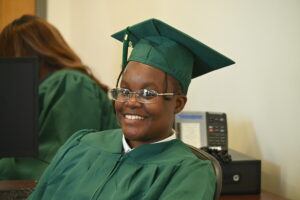Guiding First-Generation Students to Postsecondary Education Success
Where would we be without map apps and that friendly voice navigation assistant routing us to the correct destination? Unfortunately, for first-generation college students, embarking on the road to postsecondary education is like taking a road trip without GPS.
First-generation students, most broadly defined as those whose parents never enrolled in postsecondary education, make up about 40% of entering college students and one-third of graduating students.
That’s a sizeable population of students driving on unfamiliar roads. They see signs that read FAFSA, syllabus, and bursar for the first time but don’t necessarily know what they mean.
Who are these first-gen drivers?
First-generation students represent a diverse population of ages and ethnicities, with significant numbers identifying as Hispanic, Latinx, or Black students aged 24 or older.
Women account for up to 60% of first-generation students, with nearly one-third caring for children or other family members while attending school. Since a large percentage of first-generation students come from challenging financial situations, they are far more likely to juggle classes and part-time or even full-time jobs. According to National Center for Education Statistics (NCES) data, 50% of first-generation students are from households with incomes between $20,000 and $50,000.
That’s why many first-generation students are more likely to consider community college or vocational training as options for their future over a traditional, four-year college program. They are “less likely to receive financial support from family members and are more likely to perceive the process of paying for college as stressful or not worth it,” according to the white paper by Citizens and Everfi.
What are first-gen students driving toward?
While first-generation students might be starting at a disadvantage in some respects, they are a determined and caring cohort whose drive toward postsecondary education contributes tremendously to their communities.
First-generation college students tend to be active members of their campus communities. They are among the most focused on academic achievement because they place such a high value on learning, according to data collected from Campus Labs. They are also focused on achieving practical degrees and certifications to help them land better jobs than their parents.
Workers with higher education levels typically earn more and have lower unemployment rates. And if you have at least one parent with a degree, you are far more likely to complete postsecondary education yourself. So, there is no question that education is one of the best routes to overcome economic disadvantages.
But determination doesn’t make first-generation students inherently more resilient than their peers. In fact, “first-generation students scored lower than average on survey questions regarding their ability to cope with stressful situations,” noted Campus Labs. This is why dedicated support structures for first-generation students are so important.
How can we provide turn-by-turn directions to help first-gen students reach their final destination?
Evidence-based practices lead to the success of first-generation students in postsecondary education, including four-year universities, community colleges, and technical and vocational programs. The Chatfield Edge is putting these practices to work for students in the Greater Cincinnati community.
Career counseling
Many first-generation students are older, so they no longer have a high school guidance counselor to turn to for advice. The Chatfield Edge’s Education Endeavors pillar fills that gap. First, an experienced counselor conducts an interests and goals assessment with the student and works with them to explore educational opportunities supporting their career goals. Then, they take the student through a deep-dive exploration of the potential programs for them to consider, including program visits, intake interviews, and meetings with the bursar or financial aid office.
Application and financial aid support
Most postsecondary education programs require students to complete formal applications and financial aid requests. The Chatfield Edge counselor works with first-generation students to help them understand the requirements for admission into their program of choice, reviews their application submissions, and helps them complete any needed pre-admissions testing. The counselor also helps students complete the FAFSA and identify other sources of financial aid to cover as much of their education as possible. The Chatfield Edge even provides close-the-gap financial support through its Chatfield Scholars program.
Increased awareness of resources
The Greater Cincinnati community has many resources to support first-generation students, including clubs, academic support structures, and health resources. But when first-generation students are busy working, raising children, supporting other family members, and returning to school, they often don’t have the time to learn about these programs. The Chatfield Edge counselors connect first-generation students to vital community resources. For example, since many first-generation students come from low-income households, they may have graduated from high schools that didn’t push postsecondary education readiness. Referrals to writing centers, study-skills classes, and critical thinking workshops can help students bridge that gap and succeed in their choice of postsecondary education program.
Ongoing personal relationships
Simple nudges and regular check-ins go a long way toward increasing students’ confidence in their ability to succeed. Mentors provide a solid intellectual and social foundation for first-generation students that is critical to helping them complete their postsecondary education. For example, a Stanford University study found that students who took part in mentoring were 10 to 15 percent more likely to advance in their studies. The Chatfield Edge’s Future Now program is committed to supporting first-generation students far beyond the application and admissions process with ongoing mentorship because we know that everyone needs a cheerleader to help them reach their goals.
If you are a first-generation student ready to start an educational journey that can transform your life, we want to be your GPS guide, steering you toward success. Contact David Hesson at today at (513) 875-3344 ext. 112 or david.hesson@chatfieldedge.org to get started.


